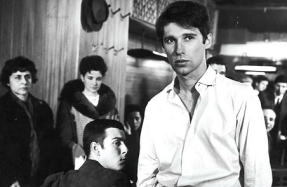
Before he became a 21st-century Stanley Kramer, cited by GQ in a recent profile as “the grown-up in the room,” Adam McKay played the more comfortable role of American comedy’s slouchy, politically savvy older brother. Improbable as his progressive-daddy glow up of the past few years might seem, the Upright Citizens Brigade co-founder, former Saturday Night Live head writer, and Academy Award-winning writer-director planted the seed of his transformation early in his predominantly unserious comedy fare. Take Step Brothers (2008), where we meet Derek (Adam Scott), the bane of developmentally arrested fortysomething protagonists Brennan and Dale’s (Will Ferrell and John C. Reilly) existence, not least because he’s Brennan’s more accomplished younger brother. McKay immediately paints the oily helicopter leasing agent as the picture of American largesse in a self-contained introductory set piece that takes place in his SUV. His hair slicked back and his body adorned with the amateur stock-trader uniform of a leather jacket and a Bluetooth accessory in his ear, the family scion leads his Ralph Lauren-clad wife (Kathryn Hahn) and Lacoste-sporting Aryan children in a protracted a cappella performance of Guns N’ Roses’ “Sweet Child O’Mine.” Aggressively stage-managing his brood from the driver’s seat—presumably to later trot them out at the “Catalina wine mixer” he hypes as the height of his profession—Derek clocks as the ultimate McKay heel, his entrance a taste of the skewering of the ruling class that the director would bank his later career pivot on.
McKay’s righteous anger at the mediocre heirs of the American corporate empire has gotten more pronounced in the years since opened with a modest jab at outgoing’s 2000 election skits.) In recent films he’s been more deliberately channelling that rage into his next act as a resuscitator of the bygone social-issues picture, although each new chapter in that authorial biography has brought diminishing returns. With his apocalyptic climate change dramedy ’, McKay has sanded down his satirical teeth to about as flat as they’ll go, in an effort to appeal to as broad a coalition of normie liberal audiences as an ornery film can hope for. A selfsatisfied jeremiad about a nation and a species lowering its standards to the point where it can only process acting on extinction-grade events at the level of taglines and slogans, is the work of an artist-agitator in a holding pattern, stuck in the transition from smart comedies about dumb people to insecure, self-flattering, and ultimately scattershot commentary.






